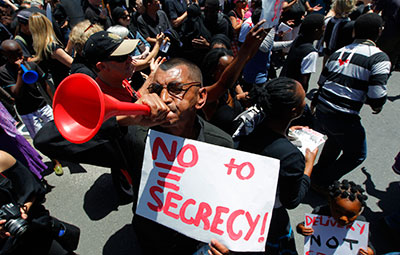South African journalists and civil society groups were uneasy this month amid rumors that the Protection of State Information Bill, commonly known as the Secrecy Bill, would pass the Upper House of parliament, the last step before a presidential signature. Since 2008, journalists and civil society have lobbied against the bill, which many fear would spell the end of investigative journalism. A number of these fears have been alleviated by nearly 200 amendments to the draft since its inception, according to the communications director of the ruling African National Congress’s (ANC) parliamentary caucus, Moloto Mothapo.
Crucial concerns, however, remain. As the bill currently stands, the security minister could classify documents without any obligation to record the reasons for doing so. And ultimately the minister would control the classification review panel that would determine applications to declassify documents. “Our main concern is: who can classify, what you can classify and how you can appeal it,” Alison Tilley, director of the Open Democracy Advice Centre, told me during a mission of press freedom groups to Cape Town last week. “We are not opposed to the law’s function to classify documents but the burden of proof should be on the authorities to prove why they are doing it.” (A press release from the groups who participated in the mission can be read here).
Fears of classification for reasons other than national security are not unfounded. Last year alone, roughly 350 documents were curiously classified by the Department of Higher Education, Murray Hunter, national coordinator of the free expression organization Right 2 Know, told me.
While the security minister would have an easy road to classifying information, journalists would have to navigate a confusing road map to access such documents. “There is no direct means to appeal the classification of documents,” Tilley said. Further, any citizen who possesses, shares, or disseminates information the government deems classified could face lengthy prison sentences. As the bill stands, the state could prosecute anyone who downloaded secret South African cables from, say, Wikileaks, and impose a potential 25-year prison sentence. Worse, the ANC backtracked recently and re-instated to the bill minimum prison sentences of 15 years for such offenses. “The maximum sentences are far, far too severe and we want these minimum standards removed,” opposition party Democratic Alliance MP Alfred Lees, a member of the committee reviewing the bill, told us.
Those who possess or disclose classified documents for purposes of exposing corruption “or other unlawful act or omission,” would be exempt from prosecution, according to the ANC’s chief whip, Nosipho Ntwanambi. But the key concession journalists are seeking–a clause that would exempt leaks in the name of safeguarding the public interest–was rejected because “you do not see it applied in other countries across the world,” said ANC MP and Justice Chair Llewllyn Landers. (While it’s true that public interest clauses are not widespread, observers in South Africa told me, other countries generally don’t have such broad classification powers nor such harsh punishments for possessing and disseminating classified documents.)
Still, the ANC has made some concessions, such as modifying the original draft of the bill to minimize the number of offices in the security department allowed to classify information.
All sides of the debate agree that a new law is needed to classify state secrets and replace the apartheid-era 1996 Minimum Information Security Standards (MISS). Landers explained to the press freedom mission how a government delegation had visited East Germany and saw that declassifying information was a terrible experience for some who lived under the Stasi regime. “Finding that their own brothers and sisters had sometimes turned against them–it could cause so many family problems. We too have an ugly past, and have a large body of information [that] we could not simply say: here it is.”
Opposition parties in the Upper House as well as some individuals within the ANC are determined to battle on until the bill is amended further. “There has been a group within the ANC who are really concerned over the bill and have made considerable efforts to ameliorate this legislation, but we are seeing pushback from the Department of State Security,” Tilley said.
Some local observers suspect the ANC’s effort to pass the bill may be due to the politicization of the intelligence services and their efforts to stop leakages of information. “We have seen in the last four years a systematic creeping of encroachment of politicization of institutions,” Democratic Alliance MP Lees said. Preventing an over-reaching ANC party is one reason why opposition Inkatha Freedom Party MP Prince M. Zulu is also opposed to the secrecy bill, he said.
With so many critical voices in parliament, our fears of the bill passing this month seem unfounded. Mothapo agrees. “The Protection of State Information Bill is changing all the time. There’s little chance it will pass this month at least,” he said.
[Reporting from Cape Town, South Africa]
